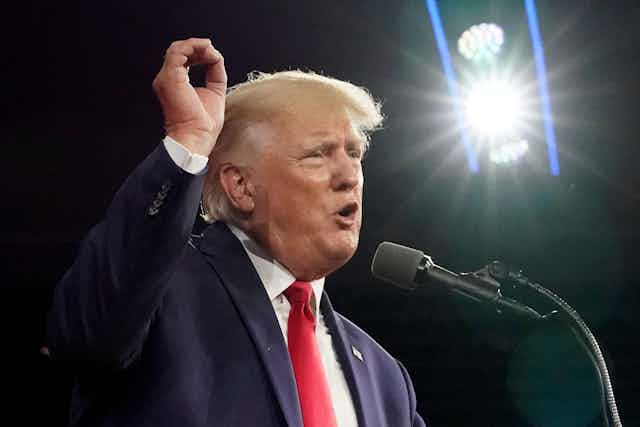The roiling civil war on Capitol Hill that’s led to the ousting of Kevin McCarthy as speaker of the US House of Representatives has left Republicans scrambling for a replacement. With no clear successor, the risk of further acute embarrassment to the party, and a slew of legislative priorities on the docket, desperation may already be setting in.
That’s led some to float the possibility of a left-field pick for the speakership — someone who’s not even serving in Congress. That man: Donald Trump.
The former president initially didn’t say no, although he has endorsed another candidate. “They have asked me if I would take it for a short period of time for the party, until they come to a conclusion,” he declared on October 5. “I’m not doing it because I want to — I will do it if necessary.”
Republican Representative Troy Nehls of Texas had said he would nominate Trump for speaker, and other potential backers range from far-right firebrand Marjorie Taylor Greene of Georgia to Floridian Greg Steube. But would Trump even be able to stand?
Although a non-member of the house has never served as speaker in the institution’s 234-year history, a speaker isn’t actually required to be a Congress member. The constitution only states that the “House of Representatives shall chuse [sic] their Speaker and other Officers”.
Under normal circumstances, Trump would qualify for the role, so long as he could garner a simple majority in the 435-person body. Undoubtedly, if he threw his hat in the ring, Trump would probably enjoy next to unanimous support within the Republican conference.
Yet there’s a wrinkle. Republican conference rules of the current 118th Congress stipulate that “[a] member of the Republican Leadership shall step aside if indicted for a felony for which a sentence of two or more years’ imprisonment may be imposed.”
Read more: Democrat failure to save US speaker hands power to Republican right
Trump faces 91 criminal indictments, spanning four criminal prosecutions, including US Department of Justice charges over the January 6 attack on the Capitol, the mishandling of classified documents, a federal case related to business fraud in New York City, and a state case over vote rigging in Georgia. Trump denies all the charges.
Party rules would need to be modified to allow Trump to serve, which would again require a simple house majority. Doing so would be highly unusual, but not impossible, in the middle of a congressional session.
Why would Trump think about it?
By seizing the speaker’s gavel, Trump could have depicted himself as the GOP’s white knight coming to save Republicans from themselves. He’s the one leader capable of unifying the party, or at least beating it into submission.
With the Iowa caucuses and New Hampshire primaries coming up, snatching the speakership now would all but ensure that Trump continued to dominate the headlines, sucking up all the oxygen in the room, leaving his rivals flummoxed, and stroking his notorious ego.
However, Trump has enough on his plate and, with a 40-plus percentage point lead ahead of his party’s other candidates in the primaries, he’s already the prohibitive favourite to win the Republican nomination. He’s in the middle of a full-scale campaign. And he’s focused on raising tens of millions of dollars just to finance his legal defence.
Running for speaker could have been a distraction, if not a demotion from his previous heights in the White House. “I’ll do whatever it is to help, but my total focus is on being president,” Trump recently said.

If Republicans couldn’t rally behind a permanent successor, Trump might also be in the awkward spot of staying on as speaker longer than anticipated. Even on his own proposed timeline – a “30, 60, or 90-day period” – he’d still need to negotiate real pieces of legislation.
The federal government will shut down in roughly 40 days without a budget or new continuing resolution. Funding for Ukraine also remains a matter of live debate.
If Trump couldn’t deliver on conservative priorities, he’d look weak. Even more than with McCarthy, Democrats would be eager to exploit Trump’s vulnerabilities. They’d be in no mood to compromise, much less grant Trump any favours.
If not Trump, then who?
Beyond Trump, Republican representatives Jim Jordan of Ohio and Steve Scalise of Louisiana are widely thought to be the main frontrunners for speaker.
Jordan is a founding member and leader of the House Freedom Caucus (a cadre of hard-right Republicans) and an outspoken champion of Trump. He’s been a leading force in the attempt to impeach President Joe Biden.
As current house majority leader, Scalise served as the “number two” man under McCarthy. While Scalise arguably enjoys more support among moderates, he’s almost certainly also to the right of McCarthy
For his part, Trump is vocally supporting Jordan, pronouncing: “He will be a GREAT Speaker of the House, & has my Complete and Total Endorsement!”
Short-term solution?
Trump as speaker had always seemed like a provocative but ultimately unlikely scenario. It would, temporarily, end the bickering and give a short-term reprieve to Republicans while they continue their not-so-private machinations and infighting. But it would just be a sticking plaster.
Trump gallivanting in to rescue the Republicans wouldn’t solve the deep divisions rife within the party. And whoever the next speaker is would be subject to the same precariousness that saw McCarthy’s abrupt ejection.
Not only that, but Trump – a figure who is accused of, less than two years ago, helping whip up a mob at the US Capitol – would have been at the helm of the “people body”. If even for a short time, that’s not nothing.
It’s an irony that shouldn’t be lost on Democrats who, by voting with a group of hard-right rebels earlier this week to expel McCarthy, paved at least the path for Trump to get there.

